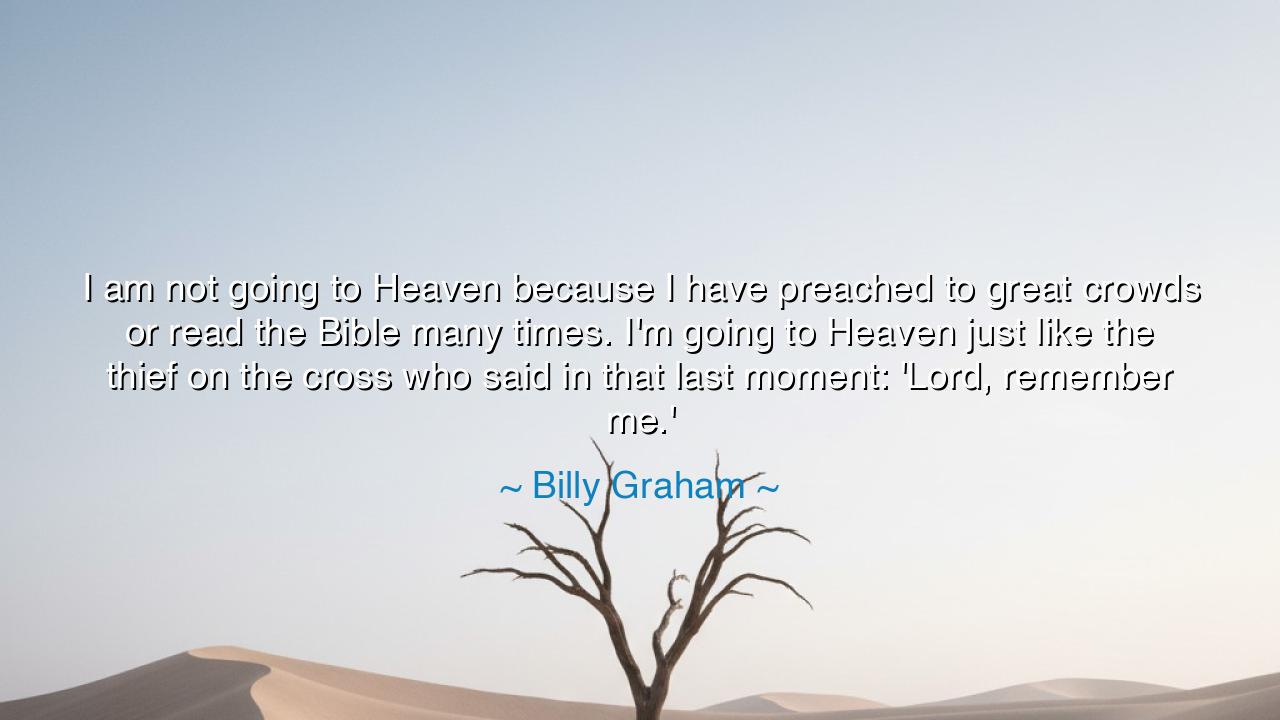
I am not going to Heaven because I have preached to great crowds
I am not going to Heaven because I have preached to great crowds or read the Bible many times. I'm going to Heaven just like the thief on the cross who said in that last moment: 'Lord, remember me.'






“I am not going to Heaven because I have preached to great crowds or read the Bible many times. I’m going to Heaven just like the thief on the cross who said in that last moment: ‘Lord, remember me.’” Thus spoke Billy Graham, the humble shepherd whose voice thundered across the world yet whose heart bowed low before God. In these words lies not the pride of a great preacher, but the wisdom of a soul that has seen through the illusions of earthly merit. He confesses, with the simplicity of the saints, that salvation is not the reward of labor or intellect, but the gift of grace. No amount of deeds, however glorious, can purchase what only mercy can bestow.
To understand this saying, one must look to the story that inspired it — the tale of the thief on the cross, as told in the Gospel of Luke. Beside the crucified Christ hung two thieves, condemned for their crimes. One mocked, but the other, broken and repentant, turned his eyes toward the dying Savior and whispered: “Lord, remember me when You come into Your kingdom.” And Jesus, bleeding yet boundless in compassion, replied: “Truly, I tell you, today you will be with Me in Paradise.” It is this moment — one of the most tender in all Scripture — that Billy Graham invoked. For in that dying thief, stripped of deeds and honor, we see the essence of faith: pure trust in divine mercy, offered when all else is lost.
Graham, who spoke to kings and multitudes, understood the peril of pride in righteousness. He knew that even the most devoted servants may mistake their service for salvation. His confession is thus a warning to the devout and the accomplished alike — that heaven cannot be earned, not even by the holiest of works. Like the thief, each soul must come to God empty-handed, with nothing but faith and repentance. It is not the grandeur of one’s ministry or the number of prayers recited that opens the gates of eternity, but the quiet surrender of the heart.
History, too, offers echoes of this truth. Consider St. Augustine, once a wanderer in sin, a man of great intellect yet deeper restlessness. No sermon, no philosophy could save him until he cast aside his pride and cried out to God in humility: “Lord, make me pure — but not yet.” Only when he surrendered utterly did peace find him. And from that surrender rose one of the greatest minds of faith. Like Billy Graham, Augustine came to see that redemption is not the crown of achievement, but the mercy of love. Both men remind us that grace is greater than all our striving — a gift to the penitent, not a prize to the powerful.
In Graham’s humility there also lies a profound democracy of salvation — the idea that the beggar and the bishop stand on equal ground before the cross. The thief, the scholar, the preacher, the sinner — all must enter through the same narrow gate of grace. No wealth of wisdom, no legacy of good works can lift a man one inch closer to heaven than the heartfelt prayer, “Lord, remember me.” It is this truth that has sustained generations of believers and comforted the dying in their final moments. For it tells us that God’s love is not measured by worthiness, but by mercy.
And yet, Graham’s message is not a call to idleness or indifference. It is not that deeds do not matter, but that they are the fruit of grace, not its price. Good works flow naturally from a heart that has been forgiven; they are the song of gratitude, not the ticket to paradise. The true disciple labors not to earn heaven, but to honor the One who has already opened its gates. Thus, the preacher’s humility teaches us that our faith must be childlike — trusting, sincere, and utterly dependent on God’s goodness.
So, my children, take this lesson to heart: do not mistake your service for your salvation. Be diligent in good works, but let them spring from love, not fear. Pray, read, labor, and serve — but never forget that it is grace that saves, and grace alone. When the day comes that you stand before the eternal Judge, may your words be the same as the thief’s: “Lord, remember me.” For in that moment of surrender, all the striving of life will fade, and only love will remain.
And thus, as Billy Graham knew, the path to heaven is not paved with sermons or scriptures, but with humility and faith. The preacher and the thief meet as equals at the foot of the cross. One brought the message of salvation to millions; the other received it with his dying breath. Yet both entered by the same door — not by greatness, but by grace. Remember this, and live not for your glory, but for God’s mercy. For in the end, it is not what we have done, but who we have trusted, that determines our eternity.






AAdministratorAdministrator
Welcome, honored guests. Please leave a comment, we will respond soon